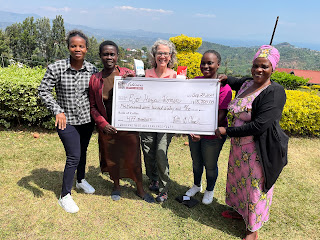A Sustainable Business-to-Business Approach to Importing Green Coffee from Women, Smallholder Producers in Rwanda
 |
| Ejo Heza women with premium check |
The study tells how Artisan rationalizes and operationalizes its values of offering great taste and consistency to its roaster customers, but also uplifts producer organizations with programs like paying women's premiums and quality control internships. Throughout the piece, the focus is on the Ejo Heza women's group of Kopakama cooperative in Rwanda. Since 2016, Artisan has been developing a relationship with this group of women.
One section focuses on improving women's skills in business management and financial literacy. In this section, the history of the microcredit program of the Ejo Heza women's group is described and the work of FES in microcredit in Latin America is highlighted.
Next, leadership opportunities for women are highlighted. In this section, readers
 |
| Marthe UWIHEREWENEMANA |
get a glimpse of the careers of three women: Marthe UWIHEReWENIMANA, Theresa UWIMANA and Betty UWIMANA. Marthe was president of the cooperative during a tumultous episode where her good leadership made a huge difference, and Theresa and Betty are models of coffee farmers who have benefited from leadership roles offered to them through the Ejo Heza women's group.
The challenge of measuring impact is squarely addressed. We share the names of somem of the indexes which have been created to help companies measure their progress on gender equity, but these do not offer collaboration in the specific areas where Artisan works. Enveritas is held up as one organization willing to collaborate with Artisan and seeing the value of combining insights from two major datasets at two different points of time but drawn from the same farmers in the one region.
Despite this one success, the challenge of measuring impact has not yet been overcome. Currently, Artisan suffices with a few (10 - 15) annual farmer interviews. The annual survey uses questions drawn from the Poverty Probability Index to gauge economic status, and other questions designed by Artisan to understand prices and productivity.
Productivity of the land and trees is an important area to understand. Artisan's business model relies on the motivational force that good prices will unleash among farmers to better pursue best practices.
 |
| Ethiopian coffee |
Almost the last section addresses the United Nations Sustainable Development Goals and outlines how work such as that of Artisan is probably address five of the SDGs:
#1 No Poverty.
#2 Zero Hunger.
#3 Good Health and Well-Being.
#5 Gender Equity.
#8 Decent work and economic growth.
Finally, the authors share their conclusions, which have a lot of emphasis on the need for new research.
 |
| Delivering coffee cherry in Rwanda |
No comments:
Post a Comment